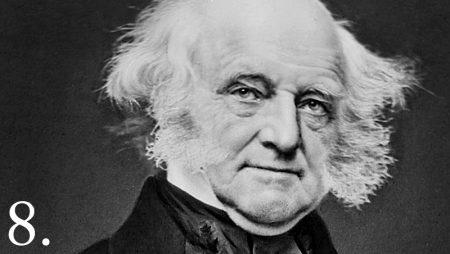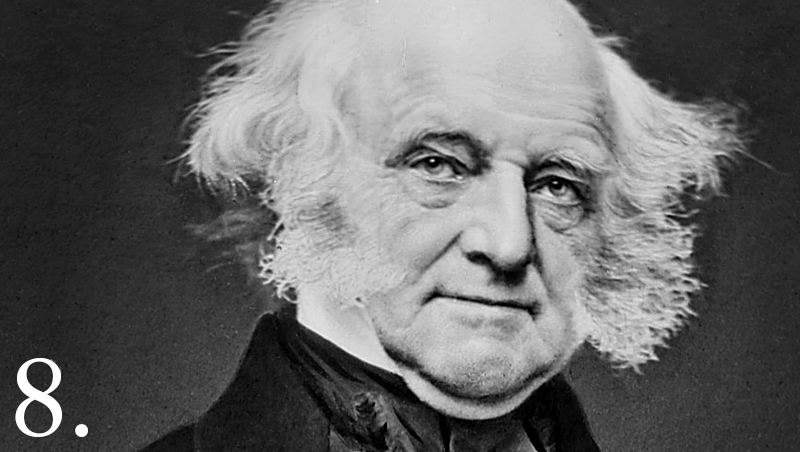NO “FOREIGN ALLEGIANCE”
by Creg Maroney, ©2016
 (Jan. 11, 2016) — It is a well-known fact that the first Article II “natural born Citizen” United States President was Martin Van Buren of New York. Even though he was a U.S. citizen alive “at the time of the Adoption of this Constitution” as Article II required for President of the United States, he wasn’t considered just a “citizen” like all the Presidents before him who were born with foreign citizenship. Even if Van Buren was born with foreign citizenship, he still would have been eligible under the Grandfather Clause in Article II, Section 1, Clause 5 of the United States Constitution because the Founders allowed [at that time] what we define now in USC 8, Section 1401 as “citizens,” who also fought in the Revolutionary War, the right to become President.
(Jan. 11, 2016) — It is a well-known fact that the first Article II “natural born Citizen” United States President was Martin Van Buren of New York. Even though he was a U.S. citizen alive “at the time of the Adoption of this Constitution” as Article II required for President of the United States, he wasn’t considered just a “citizen” like all the Presidents before him who were born with foreign citizenship. Even if Van Buren was born with foreign citizenship, he still would have been eligible under the Grandfather Clause in Article II, Section 1, Clause 5 of the United States Constitution because the Founders allowed [at that time] what we define now in USC 8, Section 1401 as “citizens,” who also fought in the Revolutionary War, the right to become President.
Martin Van Buren was more than just a “citizen.” He is known as the first “natural born Citizen” President. What made him so special? Well, we know for a fact that he wasn’t a dual citizen at birth and he didn’t have any foreign allegiance. We also know that both of his parents were U.S. citizens at the time of his birth on U.S. soil. That’s why he was the first “natural born Citizen” President, because there is no law whatsoever, then or now in the United States, that grants U.S. citizenship, let alone “natural born” citizenship from the simple fact of just being born on U.S. soil.
For example. USC 8, Sec. 1401 (a) defines a citizen as: “a person born in the United States, and subject to the jurisdiction thereof.”
This definition in (a) is the same definition in the 14th Amendment to the U.S. Constitution. What people ignorantly fail to realize and leave out are the words “AND SUBJECT TO THE JURISDICTION THEREOF.” The Congressional record made it very clear what these words mean. In 1866, Sen. Lyman Trumbull (IL), on the floor of the United States Senate, stated: “The provision is, that ‘all persons born in the United States, and subject to the jurisdiction thereof, are citizens.’
A constitutional researcher at the 14th Amendment.us blog further wrote, “That means ‘subject to the complete jurisdiction thereof.’ What do we mean by ‘complete jurisdiction thereof?’ Not owing allegiance to anybody else. That is what it means.”
To put this in proper context, illegal aliens owe allegiance to their country of citizenship. They didn’t renounce their foreign citizenship for U.S. citizenship. Their children are not born “subject to the jurisdiction thereof” for this reason. The same principle applies to foreigners visiting legally. If they had a child on U.S. soil, that child is not a U.S. citizen because the child was born with the citizenship of the parents owing allegiance to their country.
For another example that proves it takes more than being born on U.S. soil to become a U.S. citizen, we can look into (f) of the same section of the law defining “citizen:” “a person of unknown parentage found in the United States while under the age of five years, until shown, prior to his attaining the age of twenty-one years, not to have been born in the United States;…” If you are a parentless child on U.S. soil under five years old, obviously not having allegiance to any other country, you will receive U.S. citizenship. That is a high price to pay for U.S. citizenship, don’t you think? But that is the closest you will come to just being born on U.S. soil and receiving U.S. citizenship.
All of the criteria for those considered to be a U.S. “Citizen” are defined in 8 USC Section 1401. These “citizens” can run for any office EXCEPT for the office of President unless they were alive “at the time of the adoption of the Constitution,” as it specifically requires. Otherwise, only the “natural born Citizen” is eligible for POTUS. Both terms are used in Article II. They are not the same and do not have the same meaning. Read it for yourself…
UNITED STATES CONSTITUTION, ARTICLE II, SECTION 1, CLAUSE 5:
“No Person except a natural born Citizen, or a Citizen of the United States, at the time of the Adoption of this Constitution, shall be eligible to the Office of President; neither shall any Person be eligible to that Office who shall not have attained to the Age of thirty five Years, and been fourteen Years a Resident within the United States.”
The definition of a “citizen” is here:
8 U.S. Code § 1401 – Nationals and citizens of United States at birth.
The following shall be nationals and citizens of the United States at birth:
(a) a person born in the United States, and subject to the jurisdiction thereof;
(b) a person born in the United States to a member of an Indian, Eskimo, Aleutian, or other aboriginal tribe:
Provided, That the granting of citizenship under this subsection shall not in any manner impair or otherwise affect the right of such person to tribal or other property;
(c) a person born outside of the United States and its outlying possessions of parents both of whom are citizens of the United States and one of whom has had a residence in the United States or one of its outlying possessions, prior to the birth of such person;
(d) a person born outside of the United States and its outlying possessions of parents one of whom is a citizen of the United States who has been physically present in the United States or one of its outlying possessions for a continuous period of one year prior to the birth of such person, and the other of whom is a national, but not a citizen of the United States;
(e) a person born in an outlying possession of the United States of parents one of whom is a citizen of the United States who has been physically present in the United States or one of its outlying possessions for a continuous period of one year at any time prior to the birth of such person;
(f) a person of unknown parentage found in the United States while under the age of five years, until shown, prior to his attaining the age of twenty-one years, not to have been born in the United States;
(g) a person born outside the geographical limits of the United States and its outlying possessions of parents one of whom is an alien, and the other a citizen of the United States who, prior to the birth of such person, was physically present in the United States or its outlying possessions for a period or periods totaling not less than five years, at least two of which were after attaining the age of fourteen years: Provided, That any periods of honorable service in the Armed Forces of the United States, or periods of employment with the United States Government or with an international organization as that term is defined in section 288 of title 22 by such citizen parent, or any periods during which such citizen parent is physically present abroad as the dependent unmarried son or daughter and a member of the household of a person (A) honorably serving with the Armed Forces of the United States, or (B) employed by the United States Government or an international organization as defined in section 288 of title 22, may be included in order to satisfy the physical-presence requirement of this paragraph. This proviso shall be applicable to persons born on or after December 24, 1952, to the same extent as if it had become effective in its present form on that date; and
(h) a person born before noon (Eastern Standard Time) May 24, 1934, outside the limits and jurisdiction of the United States of an alien father and a mother who is a citizen of the United States who, prior to the birth of such person, had resided in the United States.


VAN BUREN WAS NOT THE FIRST NATURAL BORN PRESIDENT. He was born in 1782! The treaty of Paris was signed in 1783, which officially made the USA separate and sovereign. That means Zachary Taylor was the first natural born, because he was born in 1784!